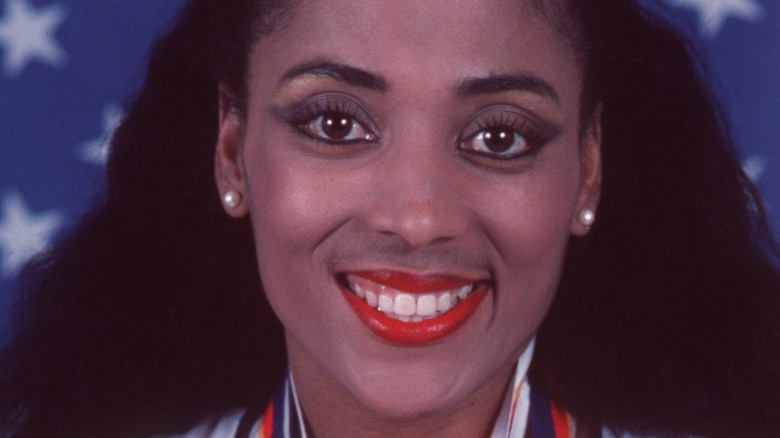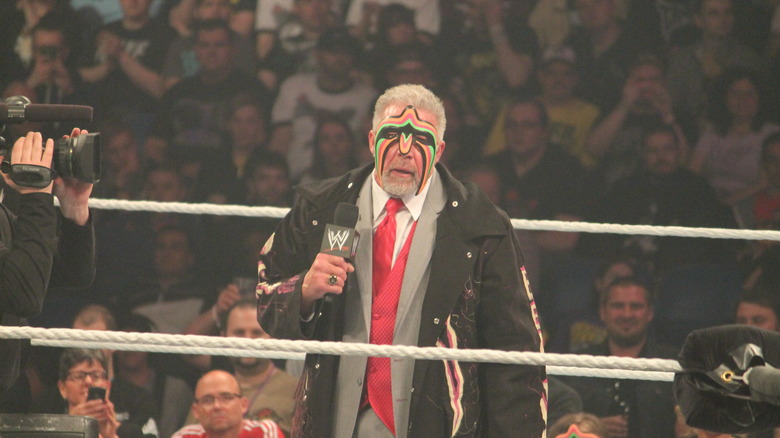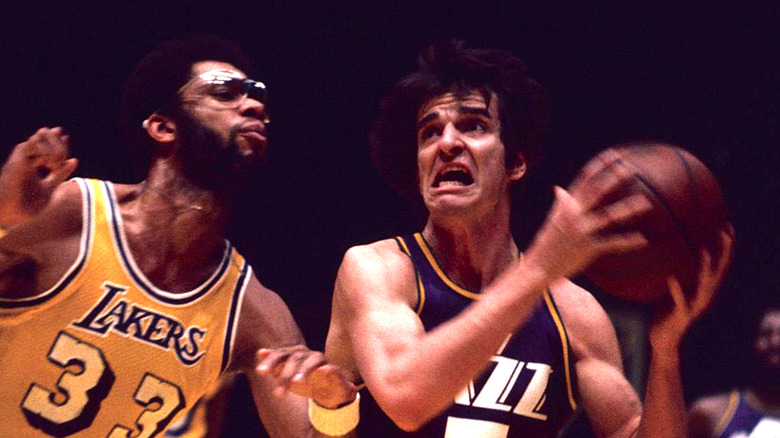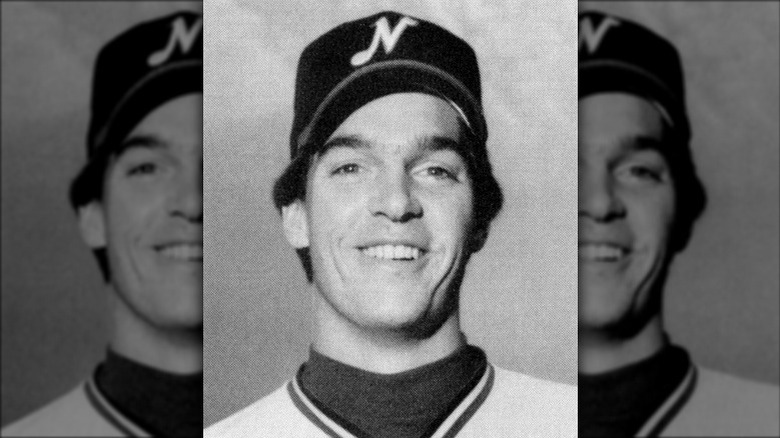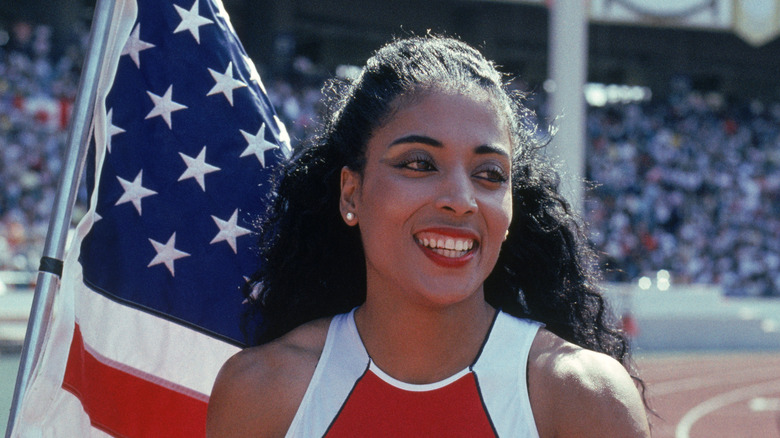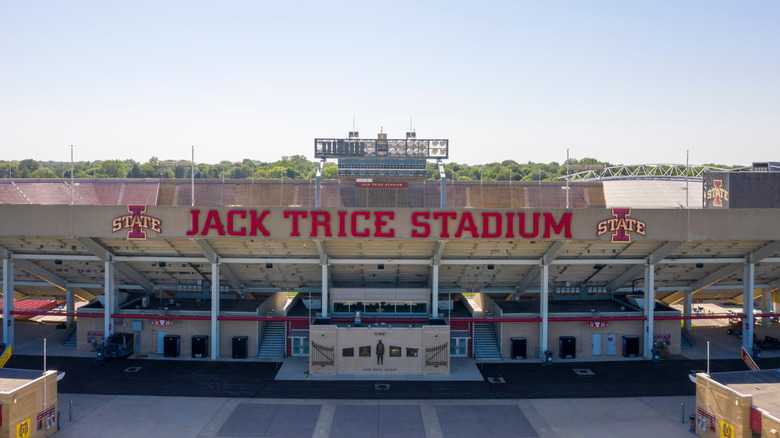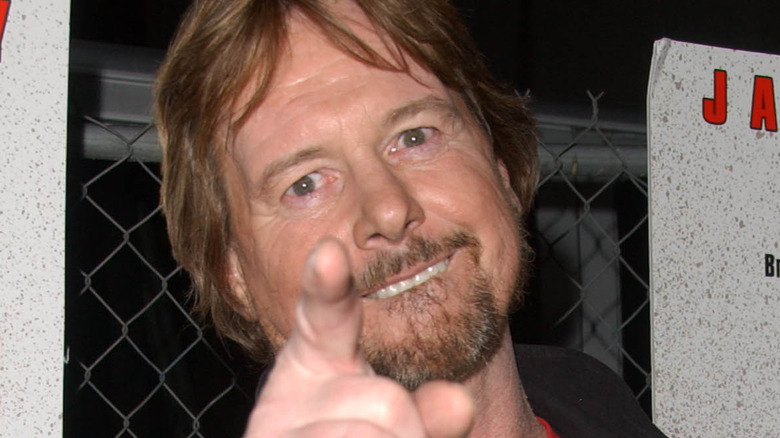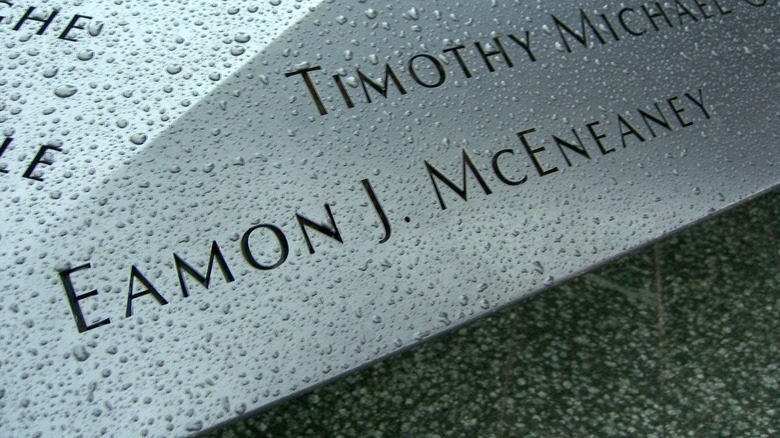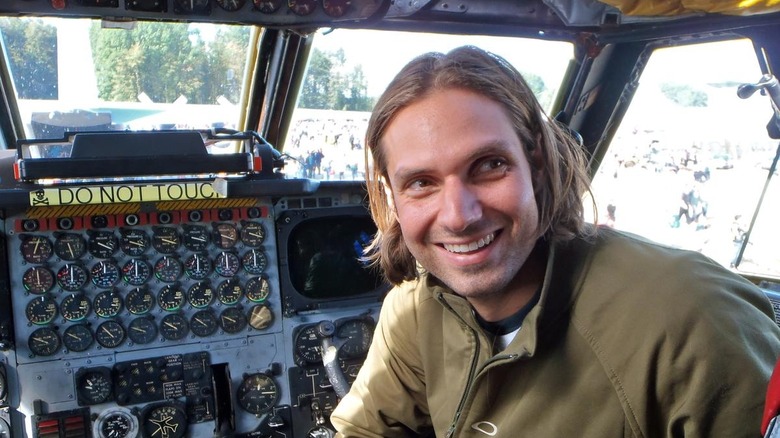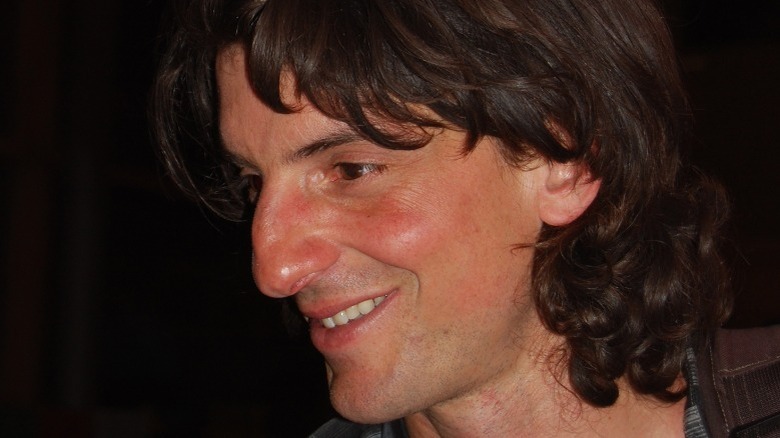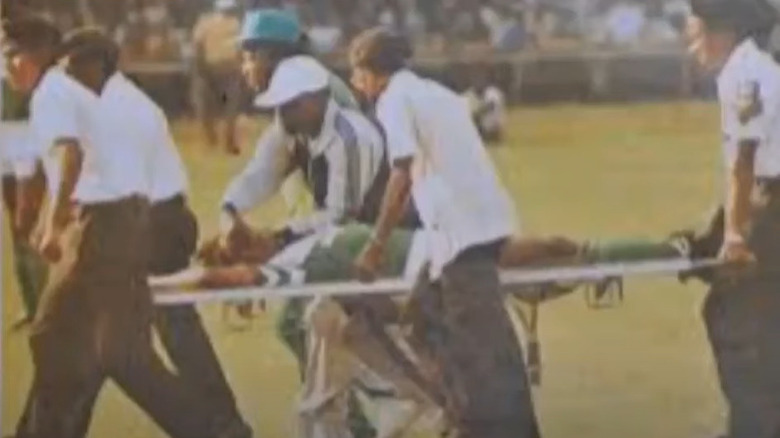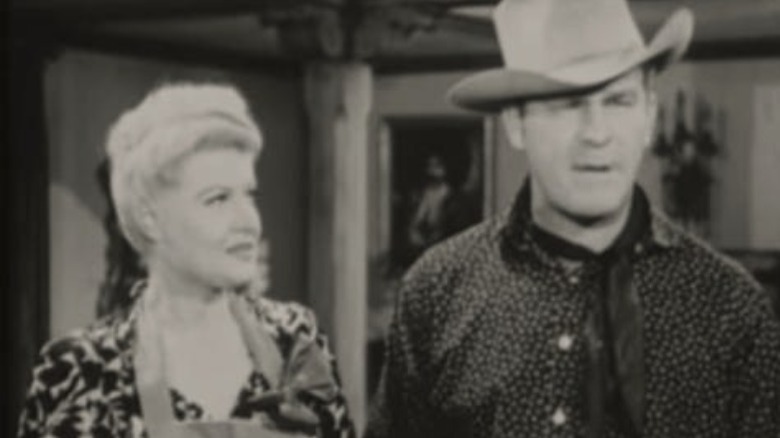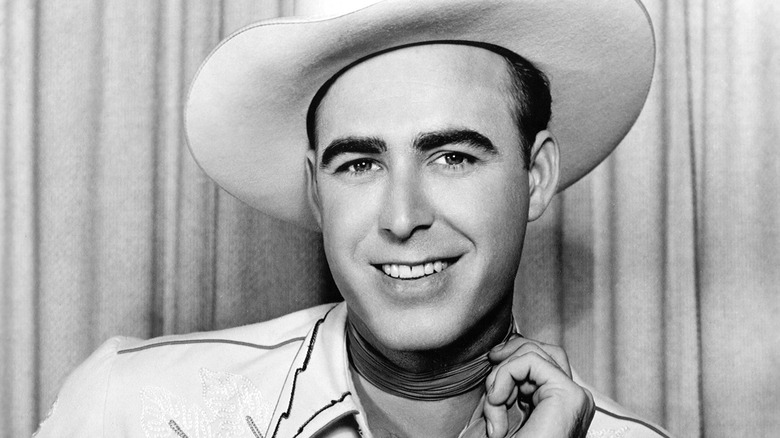Athletes Who Predicted Their Own Deaths
Professional athletes get paid to be the pinnacle of physical perfection. Their days are regimented with the amount of sleep, calories, and exercise they get down to a literal science. At the peak of an athlete's career, it can seem impossible that anything could hurt them, let alone that they will die one day. Of course, even their bodies can break down and get injured. In many cases, the physical exertion they put themselves through for decades might even speed up or contribute to an athlete's death.
Athletes are also a suspicious group. These are people who truly believe they will choke if they wear the wrong socks, or don't touch the right talisman the right number of times, or don't think the right thoughts. Everything must be just so, or bad things will happen. So when they start talking about how they are going to die, it's worth listening to. There just might be something to it. These are athletes who predicted their own deaths.
The Ultimate Warrior
James Hellwig was known to millions of wrestling fans as the Ultimate Warrior and was so synonymous with his character that he actually changed his name to simply "Warrior," according to the Los Angeles Times. So it was an emotional moment when he was inducted into the WWE Hall of Fame in 2014, and he appeared on Monday Night RAW two nights later to mark the occasion.
After the fans jumped to their feet at his entrance, Warrior gave a moving speech about life, death, and legacy. It was beautiful, and only became eerie when Warrior did, in fact, die within 24 hours of making that speech. Then it wasn't so much a generic oratory musing on great themes, but about Warrior very specifically. Did he know he was going to die? He was only 54, and by all accounts the heart attack that killed him was sudden and unexpected.
But hearing the speech now, you have to wonder. He said, in part: "Every man's heart one day beats its final beat, his lungs breathe their final breath. And if what that man did in his life makes the blood pulse through the body of others, and makes them bleed deeper, than something larger than life, then his essence, his spirit, will be immortalized by the storytellers, by the loyalty, by the memory of those who honor him and make the running the man did live forever."
Pete Maravich
Okay, let's be honest. Sometimes with death predictions, you can look at a vague statement about death someone made, or a song lyric they wrote about things ending, and then tenuously connect it to how they eventually die. You do not have to do that with Pete Maravich. His death prediction is probably the most famous and most accurate in sports history.
In 1974, Maravich had been playing in the NBA for four years, according to the Los Angeles Times. He was on the Atlanta Hawks, and for some reason the fans didn't like him much. It all came to a head when one held up a sign calling Maravich a "hotdog." Considering he'd been "the greatest scorer in major college basketball history," (via the Wilmington Morning Star) that had to hurt. So he sat down for an interview with the Beaver County Times. According to sportswriter Andy Nuzzo, what Maravich was trying to get across was "he didn't need basketball, that he could do something else." But that isn't what he said. What he said was: "I don't want to play 10 years in the NBA and die of a heart attack at age 40."
Pete Maravich played from 1970-80 and died in 1988, aged 40, from a heart attack. "That's a little scary," said Nuzzo after it happened. "The story was laying on my desk when I got to work. I read it and read it and read it and read it. I couldn't believe it. Everything matched."
Frank Pastore
By the time he died, Frank Pastore was better known as one of the biggest Christian radio hosts in the U.S., but from 1979-1986 he was an MLB pitcher, playing all but his final season with the Cincinnati Reds. According to the Hollywood Reporter, after his baseball career ended, Pastore went to college and studied, among other things, religion. He became a born-again Christian and in 2004 started broadcasting his religious talk radio show.
On November 19, 2012, Pastore was discussing an episode of Morgan Freeman's TV show "Through the Wormhole" and reflecting on the idea of there being something more after you die. "Look, you guys know I ride a motorcycle, right?" Pastore asked. "So, at any moment, especially with the idiot people who cross the diamond lane into my lane, all right, without any blinkers – not that I'm angry about it – at any minute I could be spread all over the 210. But that's [just] my body part, and that key distinction undergirds the entire Christian worldview."
This hypothetical scenario became real just three hours later. While driving home on the 210 freeway, a car in the next lane slammed into Pastore's motorcycle. He suffered major head injuries and spent the next month in the hospital. Sadly, he passed away from his wounds on December 17, after predicting what would kill him to a creepy degree. It's still up in the air whether he was right about what came next.
Flo-Jo
Al Joyner told ESPN how he and Florence Griffith got married unexpectedly, a year before they'd planned, after a magnitude 5.9 earthquake hit Los Angeles. Her reason? "I don't want to die without being married." Al remembers it wasn't said in a joking way, she was totally serious, and scared. It was the first time she'd mentioned her death to him, but it wouldn't be the last.
Florence was known by the nickname Flo-Jo after her marriage. To those around her, she was known to have a bit of the gift of premonition. This often appeared in dreams. One morning Florence woke her husband up, saying, "Al, I had this dream and you were crying. And I was telling you I was all right and everything was fine, but I couldn't reach you. But I was telling you everything was fine. I just couldn't get to you. You should know this."
According to AmoMama, Flo-Jo started writing their young daughter letters, sealing them, and instructing Al to have the girl open them when she turned 16. Somehow, Flo-Jo seemed to know she wouldn't be there. One day she told Al, "I don't want to leave Mary without a mother. If something happens to me, I want you to get married again ... you will get married again, because I'll be the one to send her to you."
Flo-Jo died of a seizure in her sleep in 1998, aged 38. There are rumors it was due to performance enhancing drug use, but there is no evidence of this.
Jack Trice
On October 5, 1923, Jack Trice, the first Black football player at Iowa State, wrote a letter to no one in particular. "To whom it may concern: My thoughts just before the first real college game of my life. The honor of my race, family, and self are at stake. Everyone is expecting me to do big things. I will! My whole body and soul are to be thrown recklessly about on the field tomorrow ... Be on your toes every minute if you expect to make good." He would be injured badly in that game against the University of Minnesota and died two days later.
The same day Trice died of his injuries, C.L. Brewer, director of the Department of Physical Education at the University of Missouri, wrote to Iowa State informing them that under no circumstances would Trice be allowed to play in the upcoming football game between the two schools, because he was Black and "you know the conditions here." So given the time and the racist attitudes that were overt and extremely dangerous, could Trice have been targeted by players on the Minnesota team due to his race? Trice must have thought it was a possibility. He did address the letter "to whom it may concern," which is odd. And why write such a letter the night before the game anyway?
The author of "Football's Fallen Hero: The Jack Trice Story" said (via AAREG), "I've talked to two people who had seen the play [where Trice was injured]. One person told me that nothing out of the ordinary happened. But another who saw it said it was murder."
Rowdy Roddy Piper
Fans of professional wrestling must grapple with the knowledge that for a variety of reasons, the men and women who provide the entertainment in the ring don't seem to go on to long, happy retirements. An inordinate number of professional wrestlers die long before they reach old age. This is a well-known phenomenon, and one that has been noted for decades.
In 2003, according to Uproxx, "Real Sports with Bryant Gumbel" dedicated an episode to looking into all the deaths of relatively young professional wrestlers. Rowdy Roddy Piper was interviewed about why he'd recently returned to the sport at age 49. He implied it was down to needing money: "What would you have me do at 49, when my pension plan I can't take out until I'm 65? I'm not gonna make 65. Let's face facts, guys."
A few years later, while still wrestling, Piper was diagnosed with cancer, and told ING he planned to get back in the ring after treatment. He beat cancer, but he was right, he did not make it 65. He died in 2015, aged 61. He might have known close to the time that it was coming, at least if you believe Hulk Hogan. In an interview for A&E's "Biography" episode on Piper (via Last Word On Sports), Hogan says his friend left him a voicemail shortly before he died, saying he'd seen "the light," was walking with Jesus, and would pray for Hogan. Hogan only listened to the voicemail after he had learned Piper had died.
Eamon McEneaney
Because the events of September 11, 2001 were so tragic and shocking, it's natural that people look back and try to find meaning in it, or a sign they missed. Grief affects people in weird ways, and as long as it's not a dangerous way to find solace, then really you should do whatever works. This is a non-judgmental way of saying that lots of people who lost loved ones on 9/11 are convinced there is spooky, unexplainable stuff relating to their loved ones' deaths.
According to ABC News, Bonnie McEneaney's eerie story of losing her husband starts before 9/11, though, because he had multiple premonitions about what was coming. Eamon McEneaney was a star lacrosse player in his college years, per U.S.A. Lacrosse Magazine, a "three-time first-team All-American" who led Cornell to two national championships, and was inducted into the National Lacrosse Hall of Fame in 1993.
McEneaney entered the corporate world and got a job with a company located in the World Trade Center. On September 2, 2001, at a barbeque, he suddenly started talking in detail about what he'd do if the towers were hit by a terrorist attack again. (Osama bin Laden had orchestrated an attack in 1993.) Then a few nights later, his wife recalled, "I was cooking, he walked in and he said, 'You had better become more of a disciplinarian with the children because when I'm gone it's going to be hard.'" A few days later, McEneaney perished along with almost 3,000 others.
Nicholas Mevoli
In an article in the Independent eulogizing Nicholas Mevoli, fellow completive freediver Sara Campbell tries to explain to laymen the weird and difficult to reconcile aspects of their sport. Apparently, freedivers approach diving to increasingly lower depths on a single breath as a form of meditation, a way of finding a deeper connection with nature and/or God. But at the same time, competitive freedivers want to win, and break records. It's walking that fine line between totally chill and professional athlete mentalities that makes them successful.
Campbell became a freediving coach and interacted with Mevoli, who was on the U.S. team. She describes him as no less than "the most promising athlete in the U.S." with "great potential and natural talent." But he was also known for being too competitive, to the point his teammates worried about him. He was pushing himself too hard, spitting up blood after dives, even blacking out in shallow water sometimes.
Mevoli's goal was to hold every U.S. national record by the end of 2013, and he only had one more chance to break one of them. In a blog posted two months before he died, Mevoli wrote, "Numbers infected my head like a virus and the need to achieve became an obsession. Obsessions can kill." The obsession did kill: despite knowing he was exhausted from a tough year, and, according to video of the dive, almost turning around and heading back to the surface twice, Mevoli fatally pushed himself to get the record. His death at 32 was the first ever in competitive freediving.
Dean Potter
When it comes to the most dangerous sports, BASE jumping is up there. In fact, according to Bandolier, it's probably the most dangerous, by a big, big margin. So if you decide to take up the sport, you have to know death is a real possibility. Still, it's a bit eerie that a man who was going to die while BASE jumping within days posted a photo of himself BASE jumping with someone who died while BASE jumping.
Men's Journal reports that on May 7, 2015, Dean Potter put a photo on Facebook of four men jumping off Yosemite's Half Dome and commented, "This is one of my all-time favorite pictures of civil disobedience. I sure miss my friend Sean Leary. He's wearing the red rig in this picture." Leary had died the year before. Potter would die nine days after making that post.
But while coincidental, that isn't the real premonition Potter had of his death. A year before he died, he'd told Outside TV in an interview, "When I was a little boy, my first memory was a flying dream. In my dream, I flew — and I also fell. I always wondered as I got older if it was some premonition of me falling to my death." On May 16, that dream would come true. Potter and a friend crashed into the mountain when BASE jumping off Yosemite's Taft Point. Potter was 43.
Sam Okwaraji
Sam Okwaraji's death on the soccer pitch in 1989 sent shockwaves through Nigeria, the Nigerian Tribune reports. Shortly before the end of a World Cup qualifying match against Angola, while play was paused as the referee gave an Angolan player a red card, Okwaraji suddenly collapsed and started foaming at the mouth, per the Cable. He was pronounced dead at the hospital, and his cause of death was determined to be a heart attack, due to an enlarged heart and high blood pressure. He was 25.
After he died, more than one claim was made that Okwaraji predicted his death beforehand. The Nigerian goalkeeper, David Ngodigha, told SuperSport, "Sam on that day seemed to know that he was leaving. So he told me in his exact words that 'I am perching on the scrotum of someone. That person wants to strike but he is being careful not to strike and miss' ... And he also warned me to be careful because he ... might not be around for too long." The Cable also reported that shortly before he died, when asked by an interviewer "What do you dread most?" Okwaraji replied, "The word death strikes me hollow."
Okwaraji's brother also remembers something odd, telling the Punch Newspaper, "The only thing I could say that was like a premonition was ... he said anybody that wanted to kill him then was coming late. He said 'my head is too big and anybody with such plan is coming late.'"
Guinn Williams Jr.
Guinn Williams Jr. ended up in Hollywood, but he took a circuitous route to get there, including playing professional baseball. He grew up playing the game, but when the U.S. joined WWI, he went off to fight. Per the Courier, once he was back home, his father wanted him to attend the U.S. Military Academy. But Williams Jr. wasn't interested: "I told my father I'd sooner play baseball and that I had an offer from the Chicago White Sox."
When his pro career didn't work out, Williams ended up in California and was typecast in Westerns. He became good friends with Will Rogers, who gave him the nickname "Big Boy." But Williams didn't give up on sports: The cowboy's hobby was polo, and he was exceptional at it. True West says he was one of the top polo players in the world, and the Texas State Historical Associations adds he was known as "the Babe Ruth of polo" because he could hit the ball so far. At one point he owned 125 polo ponies.
Will Rogers died in an airplane crash in 1935. Years later, the death of his friend was still affecting Williams. In 1962, he told fellow actor Joel McCrea, "The last three nights I dreamed about Will Rogers. He is riding Soapsuds, and he says, 'Come on, Big Boy, get on your horse and go with me!' I don't feel good, Joel. It's like he was calling me." Less than a week later, Williams was dead from uremic poisoning. He was 62.
Johnny Horton
Johnny Horton might not have ever played sports professionally, but he sure could have. If he had chosen a different path, he might not be remembered as a popular honkey tonk musician in the 1950s, but a basketball phenome in the early years of the NBA. According to Joey Allcorn, Horton was an "incredible athlete" who played basketball in high school and received scholarship offers to join a whopping 26 college teams. While he took two of them up on it for a short time, in the end Horton went with music. (Although when music wasn't paying the bills, he turned to playing a different kind of sport for money: betting on his pinball games.)
Even though his music career eventually took off, Horton was always haunted by the idea he was going to die. And not in the vague way we all know it is coming eventually, but that it would happen sooner rather than later. He told loved ones all the time that he'd trying to contact them from the afterlife. A few weeks before he died, he told a friend backstage at a show that he was going to be killed by a drunk. The premonition stayed with him, and he even tried to get out of performing in a different show, because he thought that would be the night a drunk would end his life.
Horton was off by two weeks. On November 4, 1960, he was involved in a head-on collision with a drunk driver and died. He was 35.
